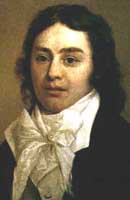The Eolian Harp Poem by Samuel Taylor Coleridge
The Eolian Harp
(Composed at Clevedon, Somersetshire)
My pensive Sara! thy soft cheek reclined
Thus on mine arm, most soothing sweet it is
To sit beside our Cot, our Cot o'ergrown
With white-flower'd Jasmin, and the broad-leav'd Myrtle,
(Meet emblems they of Innocence and Love!)
And watch the clouds, that late were rich with light,
Slow saddening round, and mark the star of eve
Serenely brilliant (such should Wisdom be)
Shine opposite! How exquisite the scents
Snatch'd from yon bean-field! and the world so hushed!
The stilly murmur of the distant Sea
Tells us of silence.
And that simplest Lute,
Placed length-ways in the clasping casement, hark!
How by the desultory breeze caress'd,
Like some coy maid half yielding to her lover,
It pours such sweet upbraiding, as must needs
Tempt to repeat the wrong! And now, its strings
Boldlier swept, the long sequacious notes
Over delicious surges sink and rise,
Such a soft floating witchery of sound
As twilight Elfins make, when they at eve
Voyage on gentle gales from Fairy-Land,
Where Melodies round honey-dripping flowers,
Footless and wild, like birds of Paradise,
Nor pause, nor perch, hovering on untam'd wing!
O! the one Life within us and abroad,
Which meets all motion and becomes its soul,
A light in sound, a sound-like power in light,
Rhythm in all thought, and joyance every where—
Methinks, it should have been impossible
Not to love all things in a world so fill'd;
Where the breeze warbles, and the mute still air
Is Music slumbering on her instrument.
And thus, my Love! as on the midway slope
Of yonder hill I stretch my limbs at noon,
Whilst through my half-clos'd eye-lids I behold
The sunbeams dance, like diamonds, on the main.
And tranquil muse upon tranquillity;
Full many a thought uncall'd and undetain'd,
And many idle flitting phantasies,
Traverse my indolent and passive brain,
As wild and various as the random gales
That swell and flutter on this subject Lute!
And what if all of animated nature
Be but organic Harps diversely fram'd,
That tremble into thought, as o'er them sweeps
Plastic and vast, one intellectual breeze,
At once the Soul of each, and God of all?
But thy more serious eye a mild reproof
Darts, O belovéd Woman! nor such thoughts
Dim and unhallow'd dost thou not reject,
And biddest me walk humbly with my God.
Meek Daughter in the family of Christ!
Well hast thou said and holily disprais'd
These shapings of the unregenerate mind;
Bubbles that glitter as they rise and break
On vain Philosophy's aye-babbling spring.
For never guiltless may I speak of him,
The Incomprehensible! save when with awe
I praise him, and with Faith that inly feels;
Who with his saving mercies healéd me,
A sinful and most miserable man,
Wilder'd and dark, and gave me to possess
Peace, and this Cot, and thee, heart-honour'd Maid!
This early poem by Coleridge is a deft and pitch-perfect expression of the visionary core of English Romanticism. In essence it details a pantheistic view of Life in which the sacred is not localized in theistic being, namely G-O-D, but permeates all beings and things. In the last stanza, Coleridge withdraws from this radical religious position because the woman he loves chides him for abandoning traditional Christian beliefs. Coleridge later endured a double tragedy: his opium use silenced his poetic voice, it's as if the dreams of opium simply swamped the dreams of poetry. But the Biographia Literaria, his prose account of his intellectual life, parallels Wordsworth's great epic poem, THE PRELUDE, which is subtitled THE GROWTH OF THE POETIC MIND. These two works are the pillars of English Romanticism, its highest intellectual expression, although not necessarily its most magical and visionary. Perhaps Shelley and Keats deserve praise for those aspects of Romanticism. The other tragedy is that Coleridge could not heal the rift between himself and Wordsworth. A friendship dashed, a collaboration severed, a fulfillment truncated. But Romanticism is all about aspiration, even if the full realization of the artist's goals falls short of expectation. And you have just read one of those aspirations - to see all life as one, an organic unity, as Coleridge puts it so succinctly, ONE INTELLECTUAL BREEZE, AT ONCE THE SOUL OF EACH AND GOD OF ALL. Oh, may we humans finally realize this Vision of Cosmic Unity in our age! !
This poem has not been translated into any other language yet.
I would like to translate this poem
A fantastic flight of imagery and marvolous style has made this poem a pleasure to read. Thanks for sharing it here.